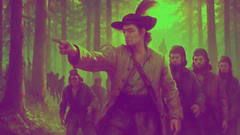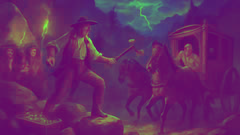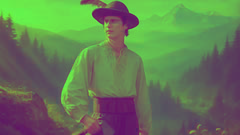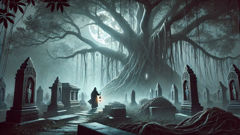Introduction
In the shadow of the Carpathian Mountains, where the forests breathe legends and the wind whispers stories across wildflower meadows, a name has echoed for centuries: Juraj Janosik. Long before Slovakia had borders on any modern map, its highlands were threaded with tales of injustice and hope, of noblemen who grew fat from peasants’ labor, and of a young man who would become the people’s unlikely champion. In taverns and cottages from Orava to Liptov, mothers would hush their children to sleep with tales of Janosik’s bravery, while shepherds and woodcutters toasted his memory by flickering firelight. He was the highwayman who robbed the rich, not for his own gain, but to place bread on the tables of starving families and coins in the hands of widows. Yet Juraj Janosik was more than a thief; he was a living legend, a symbol of rebellion and justice whose deeds blurred the line between history and myth. His life unfolded at the turn of the 18th century, an era marked by shifting empires, religious divides, and crushing feudal taxes. Born into hardship, Janosik grew up among towering spruce forests and rocky peaks, learning early that survival depended on wit, courage, and a deep sense of justice. He saw firsthand how the nobility’s cruelty squeezed the life from his people, and he vowed to make a difference. The path he chose was perilous, lined with betrayal, loyalty, and danger at every bend, but it would lead him to immortality in the hearts of his countrymen. This is the story of Juraj Janosik—the Slovak Robin Hood. His legend is woven into the very soil of the Tatras, painted in vibrant hues of defiance, sacrifice, and hope. Through his adventures, we glimpse the enduring spirit of a nation that refuses to bow to oppression, finding in his tale not just entertainment, but the promise that even the humblest among us can become a hero.
From Shepherd’s Son to Outlaw Leader
Juraj Janosik’s story began in the tiny hamlet of Terchová, nestled in the arms of the Malá Fatra mountains, where hardship was a daily companion. The son of a shepherd, Juraj grew up beneath a sky that seemed to stretch forever, running wild through meadows thick with clover and learning the ways of the forest from his father. As a boy, he was curious and sharp-eyed, quick to laugh but quicker to defend those weaker than himself. The villagers whispered that he’d been born under a lucky star, for he could climb the steepest crags and leap rivers that stopped grown men in their tracks. But no luck could shield his family from the weight of the lord’s taxes or the conscription that stole young men for endless wars.

When Juraj turned eighteen, fate came knocking in the form of Habsburg recruiters. The army needed men to fight in distant battles, and Juraj, broad-shouldered and clever, was pressed into service. He spent two grueling years in muddy camps, witnessing first-hand the suffering of common folk trampled by powerful nobles and foreign kings. The camaraderie of his fellow soldiers taught him loyalty; the cruelty of the officers, a burning hatred for injustice. When word came that his mother had died from hunger while he was away, Juraj deserted—slipping into the mountains, a fugitive from both the crown and his conscience.
Life as an outlaw was as harsh as the winters that blanketed Orava in deep drifts. For months, Juraj wandered the forests alone, stealing only what he needed to survive. It was on one bitter night, shivering beneath a spruce tree, that he encountered a ragtag band of highwaymen led by Tomáš Uhorcík—a burly, red-bearded rogue with a sharp tongue and a sharper blade. Uhorcík’s gang survived by robbing merchant caravans and noblemen’s carriages, but their methods were cruel, and their loyalty thin. Janosik, with his quick wits and easy charm, soon became indispensable. He convinced the outlaws that there was more to be gained from generosity than from greed: if they shared their spoils with the villagers, the people would shelter them and keep their secrets safe.
The transformation was gradual but profound. Under Janosik’s influence, the gang’s reputation changed; they were no longer seen as mere bandits, but as avengers for the downtrodden. Janosik’s leadership was marked by a strange code of honor. He forbade violence against the poor and punished any member who broke his rules. Instead, their targets were the carriages of Hungarian nobles, the storehouses of wealthy merchants, and the tax collectors whose ledgers were stained with blood. Each haul brought not just gold and grain, but hope—a glimmer of justice in a world grown cold. In time, word spread that Janosik himself had a magic belt, said to make him invincible, and boots that carried him faster than the wind. Whether or not these tales were true, they added fuel to the legend that was beginning to blaze across the highlands.
Deeds That Lit the Highlands
The name Janosik became a beacon in the dark times that gripped Slovakia in the early 1700s. Noblemen and their retainers lived in fortified manors, growing rich from forced labor while peasants starved in thatched cottages. Into this world, Janosik burst like a thunderclap. His exploits were daring, almost reckless—a carriage ambushed here, a storehouse emptied there, a tax collector left humiliated and penniless on the roadside. But Janosik’s genius lay not in the violence of his raids, but in the theatrical flair and generosity that followed. He was said to leave purses of gold hanging on villagers’ doors, or toss loaves of bread through open windows in the dead of night.

His most celebrated exploit took place one stormy evening near the village of Liptovský Mikuláš. A notorious count, infamous for his cruelty, was transporting a chest of gold through a mountain pass. Disguised as travelers, Janosik and his band waited in the gloom. When the carriage approached, they leapt from the rocks, overwhelming the guards before a shout could escape. Janosik, ever theatrical, tipped his hat to the count and declared, “This gold belongs to those you have wronged.” The chest was emptied into sacks, and by dawn, every hovel in Liptov was richer by a handful of coins. The count’s humiliation became a tale that traveled farther than any merchant’s wagon.
Janosik’s deeds inspired hope among the oppressed but earned him powerful enemies. The nobles banded together, placing a bounty so large on his head that even old friends hesitated to offer him shelter. Austrian soldiers, Hungarian gendarmes, and hired trackers prowled the forests with dogs, combing every cave and ravine. Yet Janosik seemed untouchable. There were whispers that he could leap canyons in a single bound, vanish into fog, or change his shape to that of a wolf or a falcon. Children sang songs about his magic belt; old women crossed themselves and left offerings at the edge of the woods.
Despite constant danger, Janosik never lost his sense of humor. In one escapade, he infiltrated a noble’s masquerade ball dressed as a foreign prince, dancing with ladies and pocketing their jewels before vanishing into the night. In another, he turned the tables on a band of bounty hunters—luring them into a bog with a trail of silver coins. But for every tale of daring there was one of kindness: Janosik rescuing an orphan from starvation, buying a sick widow medicine, or ensuring that no villager went cold during the harshest winters. His legend was not only that of an outlaw, but of a protector—the spirit of resistance made flesh.
Conclusion
The tale of Juraj Janosik ends not in triumph but in tragedy—a fitting coda for a hero whose life was both a protest and a promise. Betrayed by one he trusted, Janosik was captured in the dead of winter, shackled in iron and marched through jeering crowds to his trial. The nobles saw in him not just an outlaw, but a symbol of everything they feared: defiance, solidarity, hope. His trial was swift and merciless; the evidence was circumstantial, but the outcome never in doubt. Yet even in chains, Janosik met his fate with unbowed dignity, refusing to betray his friends or recant his deeds. When he was sentenced to death—hung by his own rib on a meathook, as local legend claims—he is said to have smiled and declared, “If you have baked me, now you may eat me.” The words were cryptic, but their meaning clear: his spirit could not be broken. His death only fueled the legend, spreading songs and stories across the Carpathians and beyond. In every generation since, Juraj Janosik has lived on as a symbol of justice for the oppressed, a champion whose courage reminds us that the fight against tyranny is never truly lost. In every forest breeze and mountain echo, the promise of Janosik endures—a hero born not just of history, but of the unyielding dreams of his people.













